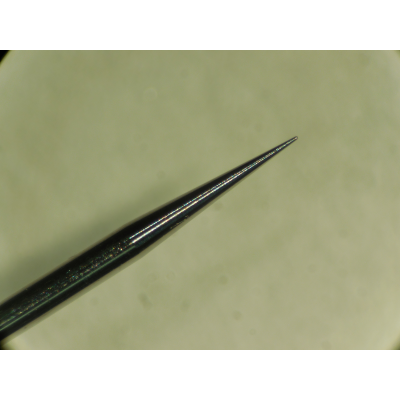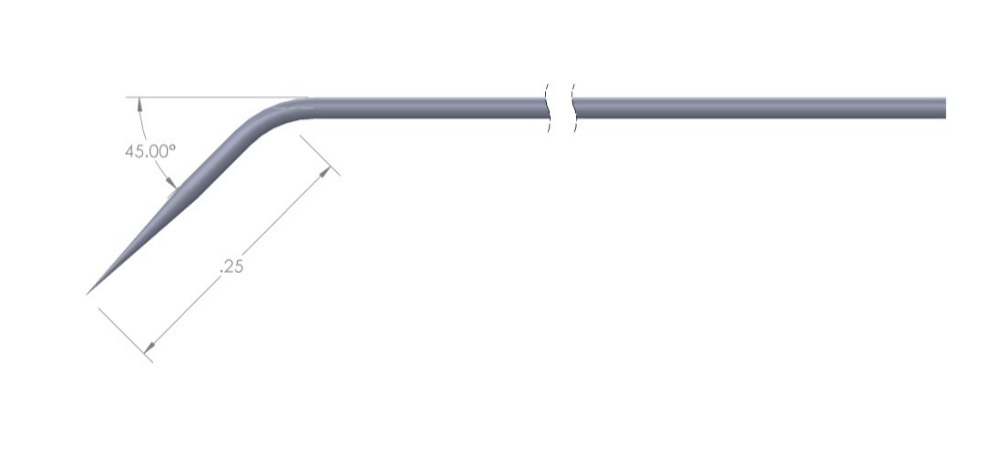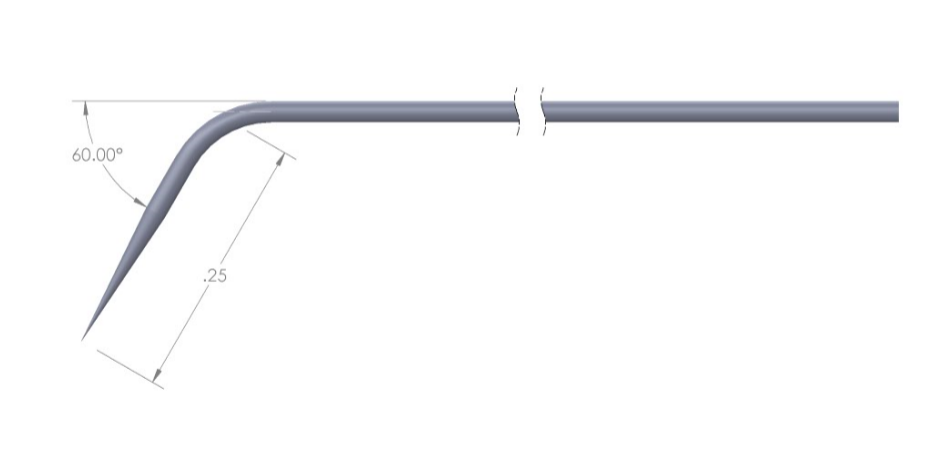The 72P Series probes are constructed from solid 20 mil Paliney® 7 alloy wire with a electro-chemially etched taper.
(*Paliney® 7 is a registered trademark of Deringer-Ney)
Features
Low contact resistance.
Non-oxidizing material.
Excellent for thermal probing at elevated temperatures.
Specifications
Paliney 7 alloy is made of several highly conductive materials.
Non-Oxidizing formula.
Low contact resistance.
Excellent for thermal probing applications.
Note:
All prices are EACH PROBE, NOT PER BOX
Sold in boxes of 10, 20, or 25.
Made to order.
See also 72G
Precious Matal Pricing Notes:
As of January 1, 2017 there has been a price increase from the raw materials supplier resulting in higher costs for this product.
Due to market pricing and precious metals fluctuations, the quoted prices may be adjusted higher than the listed price.
APT will do our best to publish prices based on current market pricing trends, however the rapid pricing fluctuations of Platinum, Gold, Silver, and Palladium can make this difficult.
-
What size probe should I use?
-
The typical recommendation is to use a probe diameter that is half to two thirds the size of the contact. Remember, APT's probes are sold by the radius, so you must double the number to determine the diameter. It is normally found that a radius larger than 20 microns does not yield lower contact resistance. An example is: The contact pad is 10 microns, using the recommendation, you would then use a probe with a radius of 2.5 - 3.5 microns. (5- 7 micron diameter)
-
Why are some probes etch and others ground?
-
There are two common ways to manufacture the probe's taper and radius: 1.Electrochemically etch 2.Mechanically grind Why is one method chosen over another? 1.The base material is the driving reason: a. Tungsten, Tungsten rhenium are typically electrochemically etched b. Paliney® 7, beryllium copper, tungsten carbide, steel are generally mechanically ground materials This is the short answer, for more details on the subject please refer to the link in the Technical Resources Area under Probe Question's.
Dimensions of the 72P Series solid Paliney® 7 probe with electro-chemically etched taper and radius:
Straight version:

72P with 45 degree bend:
72P with 60 degree bend:
The following Paliney® 7 Properties Tables are provided courtesy Deringer-Ney (the copyrighted license holder of the material)
reference website: http://www.deringerney.com/precious-metal-alloys/custom-high-performance-alloys/properties-of-paliney-7/
Properties of Paliney® 7
A superior alloy for demanding, low energy electrical contacts.Similar to Paliney 6, Paliney 7 is a Palladium, silver age-hardenable alloy that in addition contains 10% gold and 10% platinum. This alloy, with over 50 years of reliable service, is ideally suited for those extraordinarily demanding applications in which extremely long life and stable contact resistance (low noise) are critical. Paliney 7 features include high resistance to corrosion and tarnish while providing the mechanical properties of Beryllium Copper. Applications include, but are not limited to, guidance systems for military hardware, satellite communications, high-speed slip rings, and drug-delivery systems. Paliney 7 meets ASTM Standard B540 for electrical contact alloys.
| Properties of Paliney 7 | Annealed | Stress-Relieved | Ductile HT (Age-Hardened) | Heat-Treated* (Age-Hardened) |
|---|---|---|---|---|
| Resistivity, nominal, ohm-cmf | 210 | 200 | 190 | 190 |
| Modulus of Elasticity, psi, nominal, | 17 x 106 | 17 x 106 | 17 x 106 | 17 x 106 |
| microhm cm | 34.9 | 33.2 | 31.6 | 31.6 |
| Densitiy, nominal grams/cc, | 11.8 | 11.8 | 11.8 | 11.8 |
| Dwt./cu. in. | 124.5 | 124.5 | 124.5 | 124.5 |
| Solidus Temperature nominal F | 1860 | 1860 | 1860 | 1860 |
| Solidus Temperature nominal C | 1015 | 1015 | 1015 | 1015 |
| Coefficient of Linear Expansion | ||||
| / oF(70 - 212o F) nominal | 7.5x10-6 | 7.5x10-6 | 7.5x10-6 | 7.5x10-6 |
| / oC (20 - 100o C) | 13.5x10-6 | 13.5x10-6 | 13.5x10-6 | 13.5x10-6 |
| Thermal emf vs. Platinum (0 - 100C), uv/C nominal | -10 | -9 | -8 | -8 |
| Fatigue strength (rotating - bending) at 10(8) cycles, psi | 50,000 | 50,000 | 50,000 | 50,000 |
|
Wire Properties |
||||
|---|---|---|---|---|
| Proportional Limit, psi, nominal | 90,000 | 135,000 | 135,000 | 145,000 |
| Ultimate Tensile Strength, psi | ||||
| .004 - .020 dia. | 110,000-130,000 | 140,000-170,000 | 160,000-190,000 | 160,000-200,000 |
| .021 - .060 dia. | 105,000-130,000 | 130,000-170,000 | 155,000-180,000 | 160,000-200,000 |
| Elongation, % in 2" | ||||
| .004 - .020 dia. | 20 min. | 10-20 | 8-18 | 1-10 |
| .021 - .060 dia. | 15 min. | 8-25 | 8-25 | 1-10 |
| Knoop Hardness (100-gram load) | ||||
| (50-gram under .005 thick) | ||||
| .004 - .020 dia. | 200-260 | 280-340 | 320-370 | 350-410 |
| .021 - .060 dia. | 200-260 | 280-340 | 310-360 | 340-400 |
| Vickers Hardness (100-gram load) | ||||
| (50-gram under .005 dia.) | ||||
| .004 - .020 dia. | 190-250 | 265-340 | 320-380 | 330-400 |
| .021 - .060 dia. | 190-250 | 265-340 | 320-380 | 330-400 |
Please refer to this section for American Probe & Technologies cross reference to other manufactures model numbers.
Cascade Part Number |
Equivalent APT Model Number |
| 76304 | 72P-G3/100x1.25" |
| 74973 | 72P-H3/70x1.25" |




